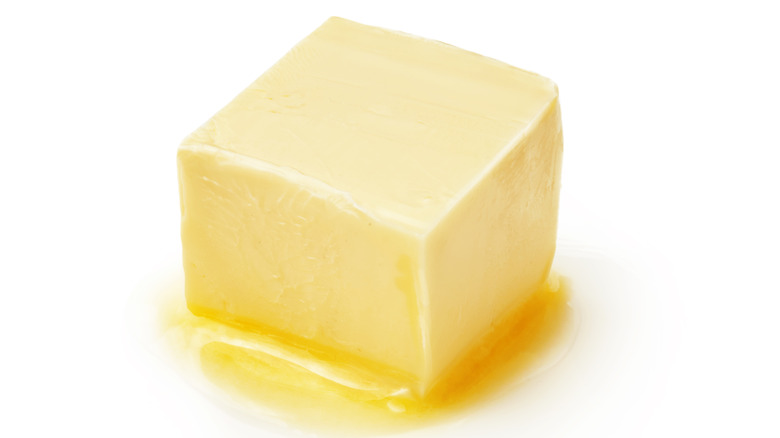How To Tell When Butter Has Gone Bad (It's Pretty Easy)
Have you ever been gathering your ingredients to make your favorite chocolate chip cookies and you reach for your butter only to stop and think about how long ago you bought it? If you have ever been concerned that your butter may be bad, you probably checked the expiration date, but that date doesn't always mean that the butter that's been in your fridge for who-knows-how-long is truly bad. And can butter even go bad?
Simply put, yes, butter can go bad over time, especially if it's not stored properly. Butter has a relatively long shelf life, but it is a perishable dairy product that can spoil. Factors that can affect the shelf life of butter include how it's stored and whether it's salted or unsalted. Generally, salted butter has a longer shelf life than unsalted butter because salt acts as a preservative. Once butter begins to spoil, though, the process happens quickly. So, how do you know if your butter has gone bad?
Checking for butter spoilage
Eating spoiled butter can be harmful to your health and in some cases, can even cause food poisoning. Spoiled butter can contain harmful bacteria, such as E. coli, salmonella, and listeria, which can cause illness if consumed, although there are some sources that dispute this and say that the worst thing that can happen is that you get a really bad stomach ache from eating bad butter. To err on the side of caution you should throw away butter that's bad.
But how can you tell if your butter has spoiled? It's easy! One, check the color. Fresh butter is usually a light yellow color, but as it begins to spoil, it may turn a darker shade of yellow or even beige. Venae Watts, a butter maker at Minerva Dairy, told Reader's Digest that spoiled butter will also show mold or other colored spots. Venae says once you've examined the butter, you can "try a little bit for the taste test. If it is bad, you will know."
Making butter last as long as possible
You may not want to taste the butter and there's another way around that — you can smell it to see if it has gone bad. Rancid butter will have a sour or stale smell that is quite noticeable, and that is a clear sign that it needs to be thrown out. If you still aren't sure, touch it. If your butter has a greasy or slimy texture, it has likely gone bad. Fresh butter should be smooth and firm.
If you want to make your butter last longer than its expiration date, you can start by making sure it's stored properly. You should keep it refrigerated in an airtight container, ideally in the coldest part of the refrigerator. Unopened butter can last in the fridge for up to three months, and opened butter can stay good for two weeks in the fridge. Butter can be frozen for four months or possibly longer if you wrap it tightly in plastic wrap or place it in a freezer-safe container.


